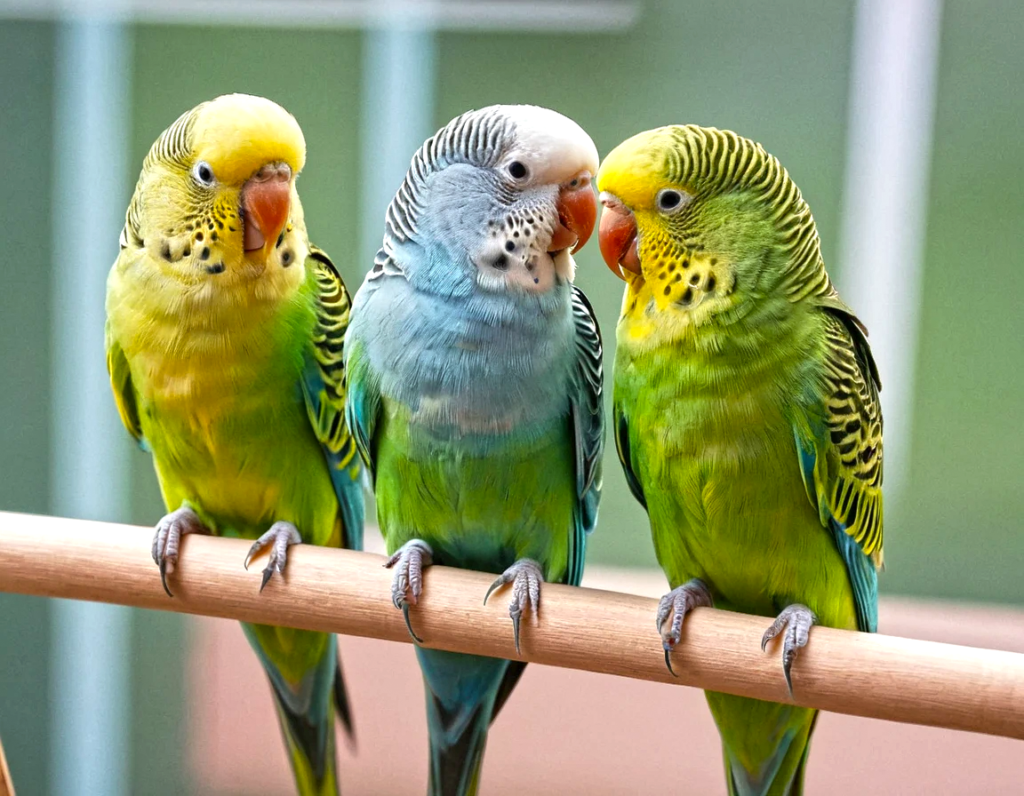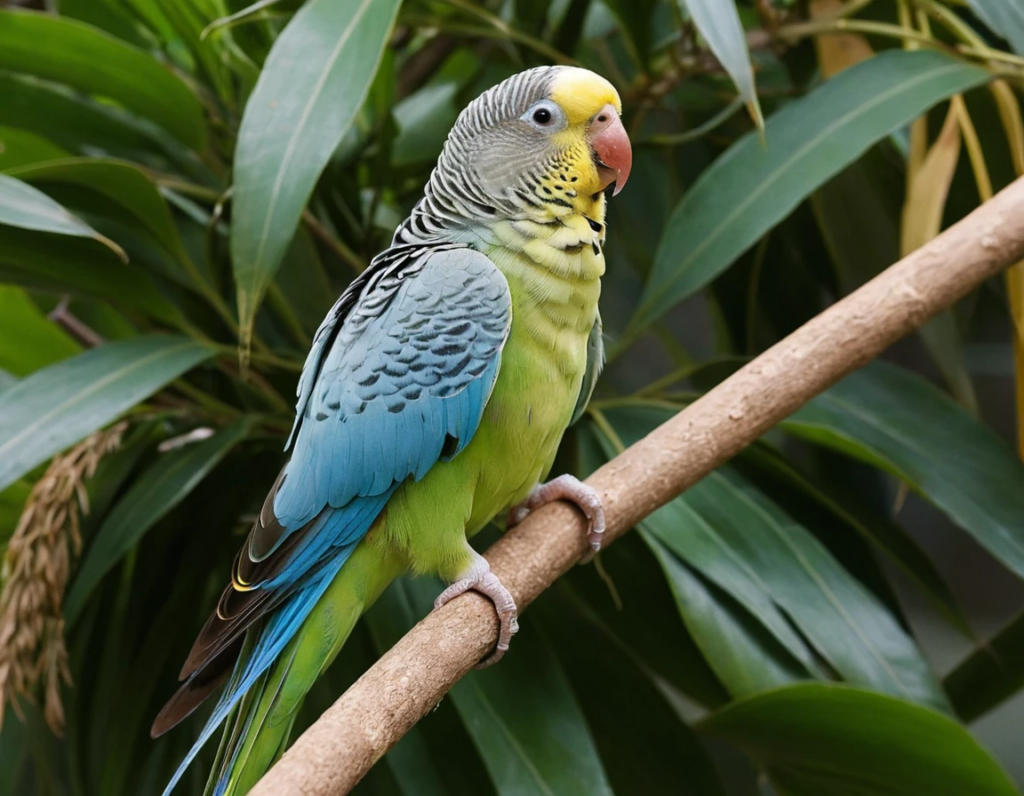
Common Diseases and Conditions
Common Diseases and Conditions in Parakeets: What Every Bird Parent Should Know
Parakeets, also known as budgies, are tiny bundles of joy with big personalities. But just like us, they can get sick. Since your feathered friend can’t exactly say, “Hey, I don’t feel so great today,” it’s up to you to spot the signs and keep them in top shape. Let’s dive into some common parakeet health problems and how to keep your bird chirping happily!
1. Psittacosis (Parrot Fever)
Sounds fancy, right? Unfortunately, it’s no VIP illness. Psittacosis, also called parrot fever, is a bacterial infection that can affect both birds and humans. If your parakeet starts acting lethargic, sneezing, or has trouble breathing, it’s time to see a vet. Treatment usually involves antibiotics, so don’t worry—you’re not alone in this!
2. Feather Plucking: Fashion Crisis or Health Issue?
If your parakeet is yanking out its feathers like a stressed-out college student during finals week, it’s a sign something’s off. Boredom, stress, or even skin infections can cause feather plucking. Make sure your bird has plenty of toys, a stress-free environment, and a balanced diet to avoid this self-inflicted “balding.”
3. Respiratory Infections
Coughing, wheezing, and excessive sneezing? No, your parakeet didn’t just catch the bird flu from Netflix (though that would be interesting). Respiratory infections often result from poor air quality, drafts, or even bacterial infections. Keep the cage clean, avoid strong fumes (yes, that includes your fancy scented candles), and if symptoms persist, visit the vet.
4. Mites and Parasites: The Uninvited Guests
Nobody likes uninvited houseguests, especially ones that make you itch. If your parakeet is scratching excessively, has crusty beak or feet, or seems more restless than usual, mites could be the issue. A vet can prescribe the right treatment, but regular cage cleaning and good hygiene can help keep these pesky bugs away.
5. Egg Binding in Female Parakeets
Ladies, imagine having an egg stuck inside you. Not fun, right? Female parakeets can suffer from egg binding, a condition where an egg gets stuck in the reproductive tract. Symptoms include sitting at the bottom of the cage, puffing up, and straining. If you suspect this, get to a vet ASAP—it’s a serious condition that needs immediate attention.
6. Overgrown Beak and Nails: A Bird’s Version of a Mani-Pedi Gone Wrong
A healthy parakeet should naturally wear down its beak and nails through chewing and perching. But if your budgie’s beak starts looking like a medieval weapon or its nails could double as knitting needles, it’s time for a trim. Provide cuttlebones, wooden perches, and an occasional nail clipping (or get a professional to do it!).
7. Fatty Liver Disease (Yes, Even Birds Can Have Diet Problems!)
Too many seeds and not enough fruits and veggies? Your parakeet might be at risk for fatty liver disease. Symptoms include obesity, abnormal feather color, and a generally sluggish bird. A balanced diet with pellets, fresh vegetables, and limited treats will help your bird stay fit and fabulous.
Keeping Your Parakeet Healthy and Happy
Preventing these common parakeet health problems is easier than you think! Here are some quick tips:
- Keep their cage clean (your parakeet deserves a tidy home!).
- Offer a well-balanced diet with fresh veggies and the right mix of seeds and pellets.
- Provide mental stimulation with toys, perches, and occasional dance parties (yes, parakeets love music!).
- Visit an avian vet for regular check-ups to catch any health issues early.
At the end of the day, a healthy parakeet is a happy parakeet. Keep an eye out for unusual behavior, keep their living space clean, and give them all the love they deserve. Your little birdie will thank you with endless chirps, head bobs, and maybe even a little dance!
Nutritional Requirements
Nutritional Requirements for Parakeets: The Secret to a Happy, Healthy Bird
Parakeets may be small, but their appetites are anything but! Feeding your feathered friend the right diet is crucial for good parakeet health. A well-balanced diet keeps them chirping, flapping, and occasionally throwing their food everywhere (because why not?). So, let’s talk about what makes a perfect meal plan for your budgie!
1. Seeds: The Fast Food of the Bird World
Parakeets love seeds—like, really love them. But just like humans shouldn’t survive on burgers and fries, your bird shouldn’t live on seeds alone. A seed-only diet can lead to obesity and nutrient deficiencies. Mix things up with other food groups to keep your bird in tip-top shape.
2. Pellets: The Superfood Your Parakeet Needs
Think of pellets as the bird version of a balanced meal. They contain essential vitamins and minerals, ensuring your parakeet gets all the nutrients they need. If your bird gives you the side-eye when you introduce pellets, try mixing them with seeds at first—like sneaking veggies into a picky kid’s meal!
3. Fruits and Vegetables: The Feathered Chef’s Special
Parakeets might be tiny, but they have a taste for the finer things in life. Fresh fruits like apples, bananas, and berries make great snacks (just remove the seeds). Leafy greens and carrots? Even better! Avoid avocados, onions, and chocolate—unless you want a very unhappy (or very sick) parakeet.
4. Protein: Because Gains Aren’t Just for Gym Rats
Believe it or not, parakeets need protein too! Boiled eggs (crumbled up, of course), small amounts of cooked chicken, and even mealworms can help keep their diet balanced. Just don’t tell your bird where the eggs come from—it’s a sensitive subject.
5. Cuttlebones and Mineral Blocks: The Ultimate Beak Buffers
Parakeets need calcium for strong bones and beaks. A cuttlebone or mineral block in the cage keeps their beaks sharp and provides essential nutrients. Plus, it doubles as an excellent boredom-buster (think of it as their version of a stress ball).
6. Fresh Water: Because Even Birds Need to Hydrate
Your parakeet may not be running marathons, but they still need fresh water daily. Change their water frequently, and if you really want to spoil them, give them a tiny bath—they might just turn it into a full-on splash party.
Keeping Your Parakeet’s Diet Balanced and Fun
Providing a varied diet is the key to maintaining good parakeet health. Here are a few quick tips:
- Rotate different fruits and veggies to keep meals exciting.
- Avoid processed or sugary foods (parakeets don’t need junk food!).
- Monitor their weight—an overweight parakeet is not a happy one.
- Make mealtime interactive with food puzzles and foraging activities.
A healthy parakeet is a happy parakeet! So, mix up their meals, give them fresh water, and watch them thrive. Your little chirping companion will thank you—with non-stop chatter and maybe even a tiny happy dance!
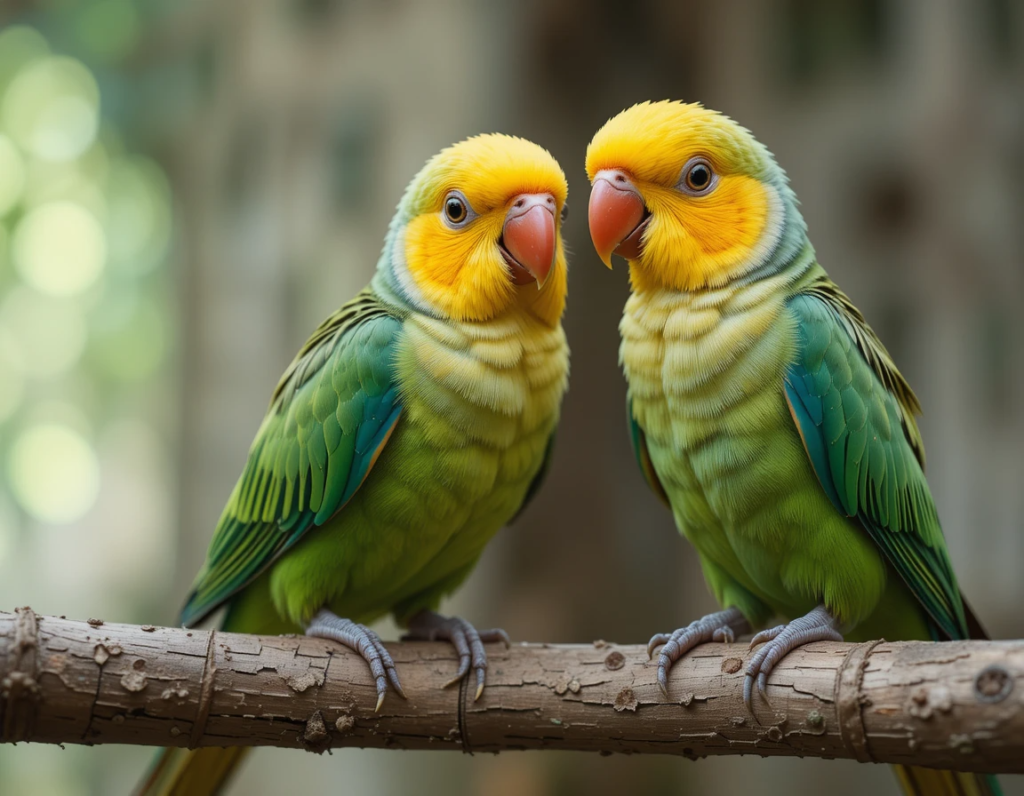
Feather Plucking
Feather Plucking in Parakeets: Why Your Bird is Going Bald (And How to Fix It!)
Parakeets are little balls of energy, always chirping, flapping, and showing off their vibrant feathers. But what happens when your feathery friend starts plucking out its own feathers? Before you panic and start shopping for tiny bird sweaters, let’s dive into why feather plucking happens and how you can help your parakeet stay fluffy and fabulous!
1. Stress: The Silent Feather Thief
Just like humans bite their nails when stressed, parakeets sometimes pluck their feathers. Changes in routine, loud noises, or even a cage that’s too small can stress out your little buddy. If your parakeet’s life is suddenly as chaotic as a reality TV show, it might be time to create a calm and comfortable environment.
2. Boredom: Because No One Likes a Dull Day
Imagine being stuck in a room with nothing to do—no TV, no phone, no books. You’d probably start pulling your hair out, right? Parakeets are intelligent birds, and if they don’t have enough mental and physical stimulation, they might resort to feather plucking out of sheer boredom. Keep their cage stocked with fun toys, perches, and even some bird-safe puzzles.
3. Diet: You Are What You Eat (Even for Birds!)
Parakeet health starts with nutrition. If your bird isn’t getting enough vitamins and minerals, feather plucking could be a sign of nutritional deficiency. Make sure their diet includes a mix of seeds, pellets, fresh fruits, and vegetables. And no, potato chips don’t count as a snack—even if your bird really wants one!
4. Parasites: The Unwanted Guests
Feather mites and skin parasites can drive your parakeet crazy, leading to excessive scratching and plucking. If you notice red or irritated skin, constant itching, or bald patches, a trip to the avian vet is in order. The right treatment can kick those uninvited guests out for good!
5. Medical Issues: Sometimes, It’s More Than Just a Bad Habit
Feather plucking isn’t always about stress or boredom. It can also be linked to underlying medical issues like skin infections, allergies, or hormonal imbalances. If you’ve tried everything and your bird is still looking more like a plucked chicken than a parakeet, it’s time for a vet visit.
6. Attention-Seeking: Drama Queen Behaviour?
Some parakeets learn that plucking their feathers gets them more attention from their humans. If you’ve been reacting every time your bird pulls out a feather, they might be doing it just to get a reaction. Instead, reinforce positive behavior with treats, playtime, and lots of love!
Keeping Your Parakeet Happy, Healthy, and Fully Feathered
Feather plucking can be a tricky problem, but with a little patience and care, your bird can get back to looking fabulous. Here’s how you can help:
- Provide plenty of mental and physical stimulation with toys and social interaction.
- Ensure a balanced diet full of essential nutrients for overall parakeet health.
- Create a stress-free environment with a cozy, well-placed cage.
- Regularly check for parasites and visit the vet if plucking persists.
A happy parakeet is a fluffy parakeet! Keep your feathered friend entertained, well-fed, and stress-free, and they’ll reward you with chirps, cuddles, and a beautiful set of feathers.
Respiratory Issues
Respiratory Issues in Parakeets: When Your Bird Sounds Like a Tiny Sneeze Machine
Parakeets may be small, but their lungs work hard to keep them flapping, chirping, and occasionally screaming at their reflection. However, when respiratory issues strike, your bird can go from a happy chatterbox to a wheezy little fluffball. Let’s break down the causes, symptoms, and treatments to help your parakeet breathe easy again!
1. Common Causes of Respiratory Problems
Just like humans, parakeets can suffer from colds, allergies, and infections. Here are some of the main culprits:
- Poor Air Quality: Dust, smoke, or even that overly strong air freshener can irritate your bird’s tiny lungs.
- Bacterial & Viral Infections: Sneezing, wheezing, and labored breathing can signal something more serious, like pneumonia.
- Mold and Fungi: A dirty cage or damp environment can lead to fungal infections like Aspergillosis, which is bad news for parakeet health.
- Nutritional Deficiencies: A diet lacking in vitamins, especially Vitamin A, can lead to respiratory distress. Time to swap out some of those seeds for fresh veggies!
2. Symptoms to Watch Out For
Your bird won’t send you a memo when they’re feeling under the weather, so keep an eye out for these signs:
- Heavy or labored breathing (if your parakeet looks like they’re trying to win a breathing contest, it’s a red flag)
- Frequent sneezing or nasal discharge (adorable, but not normal!)
- Open-mouth breathing or tail bobbing (both are signs of respiratory distress)
- Lethargy or fluffing up (a bird that’s extra puffy might be trying to fight off illness)
3. What You Can Do to Help
Nobody wants to see their feathery friend struggle to breathe! Here’s how you can take action:
- Improve Air Quality: Keep the cage in a well-ventilated area, avoid smoking nearby, and ditch the strong chemicals.
- Keep Things Clean: A clean cage means fewer germs. Change the bedding, wipe down perches, and keep food and water fresh.
- Boost Their Diet: Fresh fruits, leafy greens, and vitamin-rich foods can help strengthen their immune system.
- Visit the Vet: If your bird is struggling to breathe, don’t wait—get them to an avian vet as soon as possible.
Keeping Your Parakeet’s Lungs Happy
Parakeet health depends on clean air, a nutritious diet, and a stress-free environment. With the right care, your bird can go back to what they do best—chirping loudly at inappropriate times and making you wonder how such a small creature can have such a big personality. So, keep an eye on their breathing, show them some love, and let them enjoy a life full of fresh air and happy chirps!
Psittacosis (Parrot Fever)
Psittacosis (Parrot Fever): What Every Parakeet Parent Should Know
If your parakeet could text, they might send you a message saying, “Hey, I don’t feel so great.” But since they can’t, it’s up to you to recognize the signs of Psittacosis, also known as Parrot Fever. This sneaky disease can affect both birds and humans, so knowing what to watch for can save a lot of trouble (and vet bills!). Let’s dive into the causes, symptoms, and treatment of this tricky condition.
1. What Exactly Is Psittacosis?
Psittacosis is a bacterial infection caused by Chlamydia psittaci (yes, even birds have to deal with bacteria named after human diseases). It mainly affects parrots, including our beloved parakeets, and can spread to humans in rare cases—so this is one bird illness you don’t want to ignore!
2. How Do Parakeets Get Psittacosis?
Your feathery friend can pick up Psittacosis from infected birds, contaminated droppings, or even airborne particles (talk about bad air quality!). Stress, overcrowding, and poor nutrition can weaken their immune system and make them more vulnerable.
3. Symptoms: Is Your Bird Feeling Under the Feather?
Parakeets are excellent at hiding illness (probably because looking sick in the wild means becoming someone’s lunch). But if you notice these signs, it’s time to pay attention:
- Fluffed-up feathers (cute but concerning!)
- Sneezing and nasal discharge
- Lethargy and loss of appetite
- Labored breathing or tail bobbing
- Green or runny droppings
- Weight loss despite eating normally
If your bird has any of these symptoms, don’t just Google and hope for the best—call a vet ASAP!
4. Can Humans Catch Psittacosis? (Spoiler Alert: Yes, But Rarely)
While it’s uncommon, humans can get Psittacosis from infected birds. Symptoms include flu-like feelings—fever, chills, muscle aches, and a general desire to stay in bed all day. If you start feeling sick and your bird has been unwell, mention it to your doctor.
5. How to Treat and Prevent Psittacosis
The good news? Psittacosis is treatable! Your vet will likely prescribe antibiotics (for your bird, not you—unless you caught it, too). Recovery can take a few weeks, so be patient and follow the vet’s advice.
To prevent your parakeet from getting sick in the first place:
- Keep their cage clean and well-ventilated.
- Provide a balanced diet (good parakeet health starts with good food!).
- Avoid overcrowding birds in one space.
- Quarantine new birds before introducing them to your feathery family.
A Happy, Healthy Parakeet is a Chirpy One!
Now that you know the ins and outs of Psittacosis, you’re better equipped to keep your parakeet healthy and thriving. Regular vet check-ups, a clean environment, and a good diet can go a long way in preventing this and other bird illnesses. And remember, a chirping parakeet is a happy parakeet—so keep an eye on their health, and they’ll keep singing their little heart out!
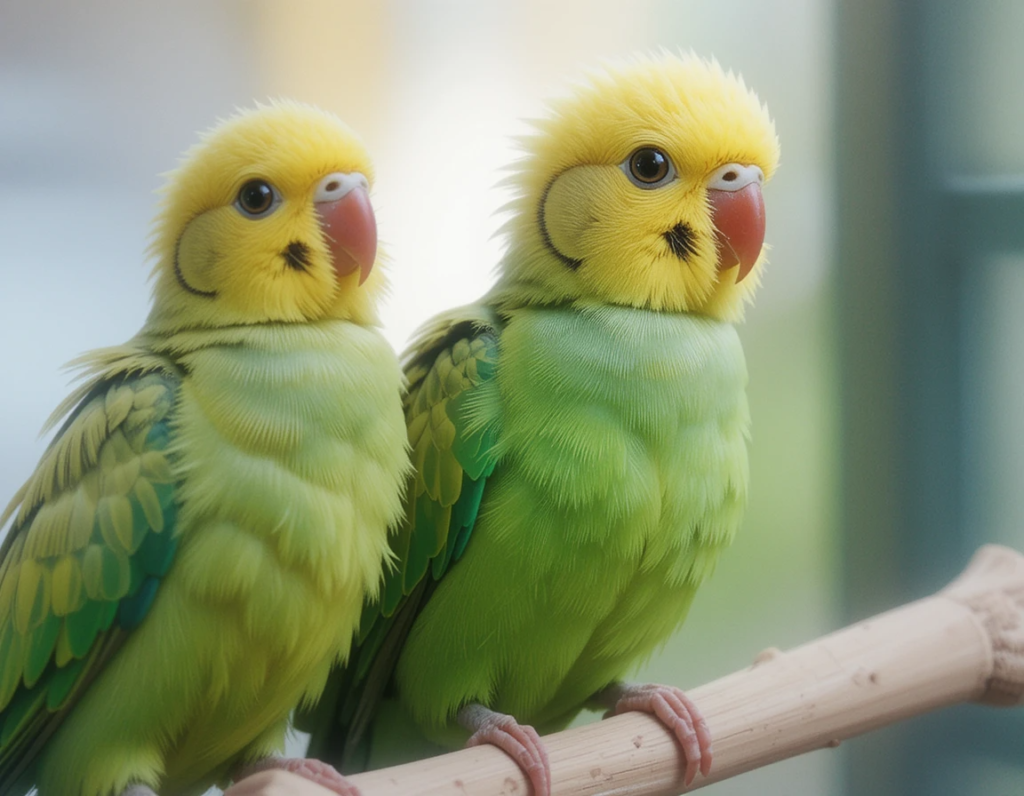
Mite and Parasite Infestations
Mite and Parasite Infestations: How to Keep Your Parakeet Itch-Free and Happy
Your parakeet spends hours preening and looking fabulous, but what happens when they start scratching a little too much? Mites and parasites can turn your feathered friend’s life into an itchy nightmare. Don’t worry—you’re not a bad bird parent! These tiny pests are sneaky, but with a little knowledge (and some action), you can keep your parakeet’s health in tip-top shape.
1. Meet the Unwanted Guests: Common Mites and Parasites
Parakeets may be tiny, but the world of mites and parasites is even tinier. Here are the most common troublemakers:
- Red Mites – These little bloodsuckers hide during the day and come out at night to feast on your parakeet. Talk about creepy!
- Scaly Face Mites – These guys love to attack your bird’s beak, eyes, and legs, causing crusty, scaly patches.
- Feather Mites – If your parakeet’s feathers are looking raggedy despite their best grooming efforts, feather mites might be the culprits.
- Internal Parasites – Worms and protozoa can mess with your bird’s digestion, leading to weight loss and general grumpiness.
2. Signs Your Parakeet Might Have Mites or Parasites
Your bird won’t tap you on the shoulder and say, “Hey, I’ve got mites!”—so you have to look for the signs:
- Constant scratching or preening
- Flaky, crusty skin around the beak, eyes, or legs
- Restlessness, especially at night
- Bald patches or irritated skin
- Weight loss and lethargy
- Red or black specks in their cage (yes, that could be mites!)
3. How to Get Rid of Mites and Parasites (Before They Take Over)
If you’ve confirmed that your parakeet is dealing with unwanted guests, don’t panic—here’s what to do:
- Clean Everything! – Mites love hiding in tiny cracks and crevices. Scrub the cage, perches, and toys with bird-safe disinfectant.
- Vet-Approved Treatments – Some mites require special sprays, drops, or even oral medications. Check with your vet before using any treatments.
- Boost Their Immunity – A healthy bird is more resistant to infestations. Ensure they have a balanced diet rich in vitamins (hello, fresh fruits and veggies!).
- Regular Checkups – Keep an eye on your parakeet’s health and visit the vet for routine checkups.
4. Prevention: Because No One Wants to Deal with Mites Twice!
The best way to handle mites and parasites? Never let them in, to begin with!
- Quarantine New Birds – Always keep new birds separate for a few weeks before introducing them to your flock.
- Keep Things Clean – A well-maintained cage is less inviting to parasites.
- Regular Grooming & Bathing – Some parakeets love a good bath! Providing a shallow dish of water or a misting spray can help keep their feathers clean and healthy.
Say Goodbye to Mites and Hello to a Happy Bird!
Mites and parasites may be small, but they can cause big problems for your parakeet’s health. With the right prevention and treatment, your bird can stay itch-free and full of energy. So, keep their environment clean, their diet balanced, and their feathers fluffed—and enjoy all the chirps and cheerful flapping from a happy, healthy parakeet!
Egg Binding
Egg Binding in Parakeets: When Laying an Egg Becomes a Sticky Situation
If your female parakeet is looking a little puffed up, acting uncomfortable, and refusing to sing her usual cheerful tunes, she might be dealing with egg binding. While laying eggs should be a natural process, sometimes things don’t go as planned, and that tiny egg can get stuck. Let’s crack open the facts (pun intended) and see how you can help your little feathered friend!
1. What is egg binding?
Egg binding happens when a female parakeet struggles to pass an egg. Instead of smoothly laying it and moving on with her day, she ends up with an egg stuck inside, which can be dangerous if not treated quickly. Think of it as the bird version of a really bad traffic jam—except inside her tiny body.
2. Causes of Egg Binding
Several factors can lead to egg binding, including:
- Calcium Deficiency – Calcium is crucial for strong eggshells and muscle contractions. Without enough, the egg might get stuck halfway.
- Obesity – A poor diet or lack of exercise can make it harder for a bird to push the egg out.
- First-Time Mom Problems – Young or inexperienced birds might struggle more with their first eggs.
- Lack of Proper Nesting Conditions – Stress, poor lighting, or a lack of a cozy nesting area can make a bird hesitant to lay her egg.
3. Signs Your Parakeet Might Be Egg Bound
Since your bird won’t send you a memo saying, “Hey, I need help with this egg!”, you’ll need to watch for these symptoms:
- Puffing up and sitting at the bottom of the cage
- Straining or excessive tail bobbing
- Weakness or lethargy
- Swollen abdomen
- Loss of appetite
- Trouble perching or balancing
4. How to Help an Egg-Bound Parakeet
If you suspect your bird is struggling with egg binding, don’t panic—here are a few things you can try:
- Provide Warmth & Humidity – A warm, steamy environment (like a humid bathroom) can help relax her muscles.
- Gently Massage the Area – Sometimes, a light belly rub can encourage the egg to move along.
- Offer Calcium Supplements – Crushed eggshells, cuttlebone, or vet-approved calcium drops can help with muscle contractions.
- Vet Intervention – If the egg doesn’t pass within 24 hours, seek veterinary help immediately. In severe cases, the vet might have to assist in removing the egg safely.
5. Preventing Egg Binding in the Future
Nobody likes dealing with an egg-related emergency, so prevention is key:
- Provide a balanced diet with plenty of calcium and vitamins.
- Ensure she has proper nesting materials and a stress-free environment.
- Avoid overbreeding, as frequent egg-laying increases the risk of binding.
- Give her plenty of exercise to keep her body in top shape.
Keep Your Parakeet Happy and Healthy!
Egg binding is a serious condition, but with the right care, your parakeet can bounce back and stay healthy. Keeping an eye on her diet, environment, and stress levels will go a long way in preventing future egg-laying issues. A happy, healthy parakeet is a chirping, energetic one—so let’s make sure she keeps flapping, not struggling!
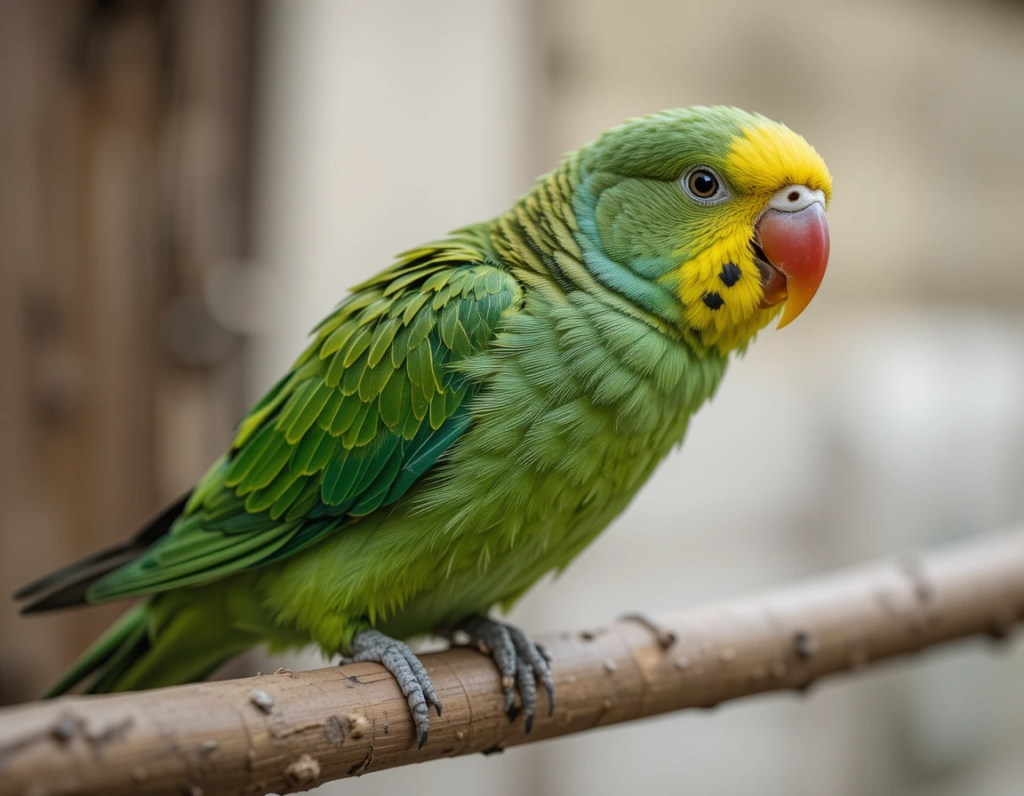
Behavioral Enrichment
Behavioral Enrichment for Parakeets: Because Bored Birds Are Grumpy Birds
If your parakeet spends all day staring at you like you owe them money, chances are they need some behavioral enrichment. These tiny, intelligent birds crave stimulation, and without it, they might turn into little feathered troublemakers. So, let’s talk about how to keep your parakeet entertained, engaged, and in great health!
1. Why Behavioral Enrichment Matters
Imagine being stuck in a room with nothing to do—no TV, no phone, not even a crossword puzzle. Sounds awful, right? Well, that’s what life can feel like for a parakeet without proper enrichment. Lack of stimulation can lead to boredom, stress, and even bad habits like feather plucking or excessive screaming (your neighbors will love that one).
2. Types of Behavioral Enrichment
Parakeet health isn’t just about diet and vet visits; mental stimulation is just as important. Here are some fun and simple ways to keep your bird’s life exciting:
a. Toys, Toys, and More Toys!
Parakeets love toys almost as much as they love chirping at 6 AM. Rotate different types of toys to keep things interesting:
- Chew Toys: Great for beak health and keeping them busy.
- Mirrors & Bells: Perfect for birds who love to chat with their “twin.”
- Foraging Toys: Hide treats inside for an exciting challenge.
b. Social Time and Training
Parakeets are social creatures, and they thrive on interaction:
- Talk to your bird often—yes, even if they ignore you half the time.
- Teach them tricks like stepping up, turning around, or even talking!
- If possible, get them a bird buddy (as long as they get along).
c. Free Flight & Exploration
A parakeet stuck in a cage all day is like a person stuck at work 24/7. Let them out to stretch their wings in a safe, bird-proofed area. Just be prepared for the occasional game of “Catch Me If You Can.”
d. Music and Nature Sounds
Some parakeets love a little background music or nature sounds. Try playing gentle tunes and see if your bird starts grooving (yes, parakeet dancing is a thing!).
3. The Benefits of Behavioral Enrichment
Keeping your parakeet engaged isn’t just about entertainment—it directly impacts their health. A happy, stimulated bird is:
- Less likely to develop stress-related illnesses
- More active and physically fit
- Less prone to destructive behaviors
- Overall, just a much better roommate!
Final Chirps
Parakeet health isn’t just about food and cage cleanliness—it’s also about keeping their little bird brains happy. By providing toys, social time, flight opportunities, and mental stimulation, you’ll have a parakeet that’s not only healthy but also a joy to be around. So, get creative, mix things up, and watch your feathery friend thrive!
Avian Gastric Yeast
Avian Gastric Yeast: What Parakeet Owners Need to Know
If your parakeet is losing weight, acting sluggish, or looking at their food like it personally offended them, they might be dealing with Avian Gastric Yeast (AGY). This sneaky little infection, also called Macrorhabdus ornithogaster (try saying that three times fast), can cause major digestive problems. But don’t worry—you don’t need a PhD in bird health to help your feathered friend. Let’s break it down in simple terms.
1. What is Avian Gastric Yeast?
AGY is a fungal-like organism that sets up camp in a bird’s digestive system, specifically in the proventriculus (a fancy word for their stomach). Unlike your typical yeast infection (yes, birds can get those too), this one messes with digestion and nutrient absorption, making parakeets sick over time.
2. How Do Parakeets Get AGY?
The worst part? AGY spreads easily. It can pass from bird to bird through food, water, or even just sharing a perch. If you have multiple birds, one infected parakeet can quickly turn into a full-blown outbreak.
3. Symptoms of Avian Gastric Yeast
Parakeet health relies on a good digestive system, so when AGY hits, it shows in their eating habits and overall condition. Look for:
- Chronic weight loss (even if they’re eating well!)
- Regurgitation or vomiting
- Undigested seeds in droppings (yes, poop inspection is part of bird ownership!)
- Fluffed-up feathers and lethargy
- Poor appetite and general grumpiness
If your parakeet is exhibiting these signs, it’s time for a vet visit. No DIY remedies—AGY needs proper treatment!
4. How to Treat and Manage AGY
Unfortunately, AGY isn’t an easy fix. But with patience and care, your bird can recover. Here’s what helps:
- Antifungal Medication – Your vet may prescribe antifungal meds to control the infection.
- Diet Adjustments – Cut down on sugary and high-carb foods, as yeast thrives on these.
- Clean, Clean, Clean! – Regularly disinfect cages, perches, and food bowls to prevent reinfection.
- Separate Infected Birds – If you have multiple parakeets, isolate the sick one to prevent spreading.
5. Preventing Avian Gastric Yeast
The best way to deal with AGY? Avoid it altogether! Keep your parakeet’s health in check by:
- Offering a balanced diet with fresh veggies and quality bird food
- Keeping their environment clean and stress-free
- Regular vet checkups (even when they seem fine!)
- Avoiding overcrowding in cages
Final Thoughts
Avian Gastric Yeast may sound scary, but with the right care, your parakeet can bounce back. Keep an eye on their eating habits, maintain cleanliness, and provide a healthy diet to keep their digestive system running smoothly. After all, a happy stomach means a happy (and very chatty) parakeet!
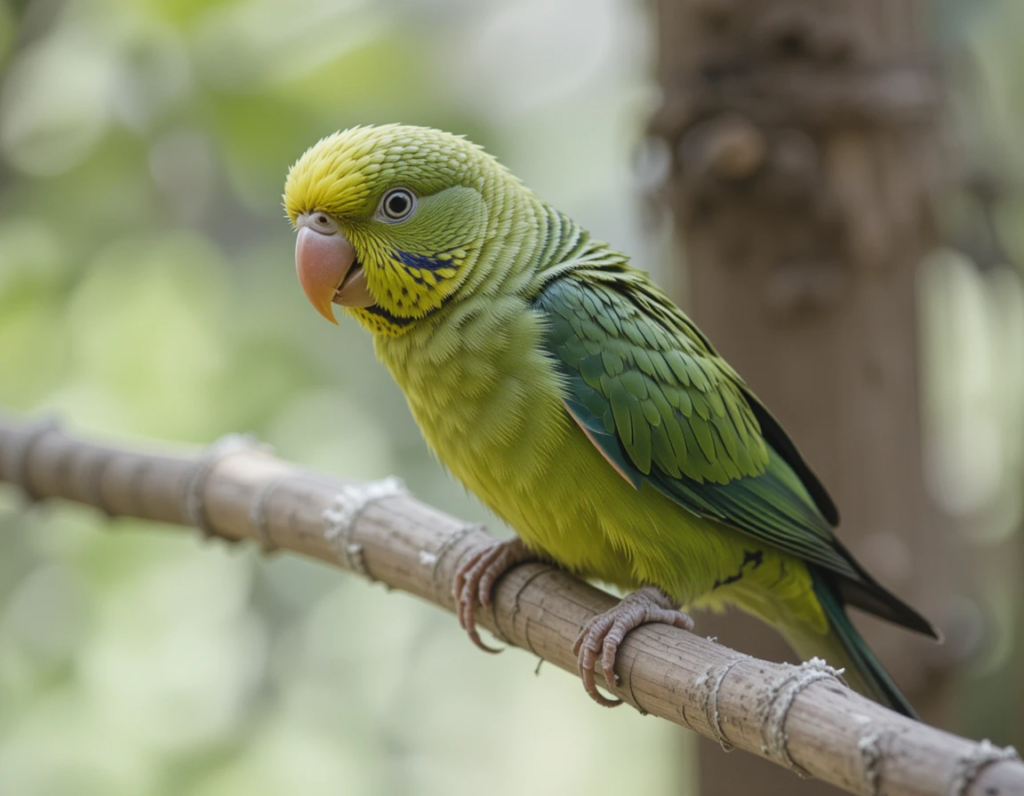
Regular Veterinary Care
Regular Veterinary Care: The Secret to a Happy, Healthy Parakeet
Your parakeet may be tiny, but their health is a big deal! While they might look perfectly fine, birds are experts at hiding illnesses. That’s why regular veterinary care is essential to keep your feathery friend in top shape. Let’s dive into why vet visits matter and how to make them stress-free for both you and your parakeet.
1. Why Do Parakeets Need Regular Vet Visits?
Imagine if you never visited a doctor—sure, you might feel okay, but what if something was brewing under the surface? The same goes for parakeets. Regular check-ups can catch early signs of illness before they become serious problems. A healthy bird is a happy bird, and a happy bird makes for a much quieter trip to the vet (and less squawking in protest).
2. How Often Should You Take Your Parakeet to the Vet?
- Annual Check-ups – Even if your parakeet seems fine, a yearly vet visit helps monitor their overall well-being.
- Signs of Illness – If your bird is acting off—fluffed up, losing weight, or suddenly less chatty—it’s time to book an appointment ASAP.
- New Bird Exams – Just brought home a new parakeet? A vet check ensures they’re healthy and not bringing any unwanted surprises (like mites or infections) to the flock.
3. What Happens During a Vet Visit?
Your parakeet might not love the vet (who does?), but it’s all for their well-being. Here’s what to expect:
- Physical Exam – The vet will check their feathers, beak, eyes, and weight.
- Droppings Test – Yes, poop analysis is a thing, and it can reveal a lot about your bird’s health!
- Beak & Nail Trims – If needed, the vet can trim overgrown nails or a misaligned beak.
- Diet & Care Advice – Your vet may suggest dietary tweaks to improve your parakeet’s health.
4. How to Make Vet Visits Less Stressful
Parakeets aren’t known for their love of travel (unless it’s flying circles around your living room). Here are some ways to make vet trips easier:
- Use a Secure Carrier – A small, well-ventilated cage covered with a light cloth can help them feel safe.
- Keep the Car Ride Calm – Avoid loud music or sudden stops. Your bird already thinks this is an abduction.
- Bring a Favorite Treat – A little millet reward after the visit can make the experience more positive.
5. Preventative Care at Home
Regular vet visits are important, but so is daily care. Keep your parakeet’s health in check with:
- A balanced diet (seeds alone won’t cut it!)
- Fresh water daily
- A clean cage (because nobody likes a messy home)
- Plenty of mental and physical stimulation
Final Chirps
Your parakeet might not send you a thank-you note for taking them to the vet, but their good health will be all the gratitude you need. Regular veterinary care ensures your feathered buddy stays active, happy, and full of energy (aka, still waking you up at dawn). So, make those vet appointments a priority—your parakeet’s health depends on it!
frequently asked questions (FAQs) about Parakeet
1. How can I tell if my parakeet is sick?
Answer: Look for signs like fluffed-up feathers, lethargy, loss of appetite, trouble breathing, or unusual droppings.
2. How often should I take my parakeet to the vet?
Answer: An annual check-up is recommended, but if you notice any signs of illness, visit a vet immediately.
3. What should a healthy parakeet’s droppings look like?
Answer: Normal droppings have a firm, greenish or brownish part, a white urate section, and a clear liquid. Any drastic changes could indicate illness.
4. Why is my parakeet sneezing?
Answer: Occasional sneezing is normal, but frequent sneezing with nasal discharge may mean an infection, allergies, or poor air quality.
5. Why is my parakeet losing feathers?
Answer: It could be normal molting, but excessive feather loss might be due to stress, parasites, or an underlying health issue.
6. What is the best diet for my parakeet?
Answer: A balanced diet includes high-quality pellets, fresh vegetables, fruits, and some seeds.
7. Can parakeets eat human food?
Answer: Some human foods like leafy greens, carrots, and apples are safe, but avoid chocolate, avocado, caffeine, and salty foods.
8. How do I know if my parakeet is dehydrated?
Answer: Signs include sunken eyes, lethargy, and dry skin. Make sure fresh water is always available.
9. Why is my parakeet refusing to eat?
Answer: Stress, illness, or boredom can be reasons. If they refuse food for more than a day, consult a vet.
10. Do parakeets need supplements?
Answer: If they eat a varied diet, supplements aren’t necessary, but calcium (like cuttlebone) and vitamin D can help.
11. What is psittacosis (parrot fever), and can my parakeet get it?
Answer: Psittacosis is a bacterial infection that affects birds and can spread to humans. Symptoms include respiratory issues and lethargy.
12. What causes respiratory problems in parakeets?
Answer: Poor air quality, infections, or nutritional deficiencies can lead to breathing issues.
13. What is egg binding, and how can I prevent it?
Answer: Egg binding happens when a female bird struggles to lay an egg. Providing calcium and a stress-free environment can help prevent it.
14. How do I treat mites or parasites on my parakeet?
Answer: If you notice itching, feather loss, or red skin, consult a vet. Cleaning the cage regularly can help prevent infestations.
15. What is Avian Gastric Yeast (AGY), and how does it affect parakeets?
Answer: AGY affects digestion, leading to weight loss and undigested seeds in droppings. It requires vet treatment.
16. Why is my parakeet plucking its feathers?
Answer: It could be due to stress, boredom, poor diet, or illness. Ensure they have plenty of mental stimulation.
17. Do parakeets need a companion for good health?
Answer: While they can be kept alone, they are social birds and benefit from interaction with another parakeet or frequent human attention.
18. How can I make my parakeet’s environment healthier?
Answer: Provide a spacious cage, fresh air, clean water, a varied diet, and mental stimulation with toys.
19. Why is my parakeet sitting at the bottom of the cage?
Answer: This is often a sign of illness or injury. If your bird is lethargic, seek veterinary care.
20. How can I prevent my parakeet from getting sick?
Answer: Keep their cage clean, provide a balanced diet, schedule vet check-ups, and avoid exposure to drafts or toxins.

